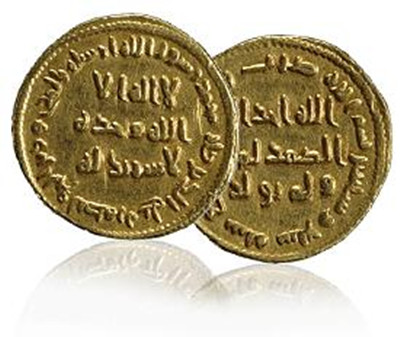This series is a history told through 'things', and this programme is about two coins-about what we would now call a currency change. But they're two coins that sum up one of the greatest political upheavals ever-the permanent transformation of the Middle East in the years following the death of the Prophet Muhammad. For Muslims, the clock of history was reset when, in 622 in the Christian calendar, Muhammad and his followers moved from Mecca to Medina. That event, the Hijra, became for Islam Year 1 of an entirely new calendar. For his followers, the prophet's teachings had so transformed society that time had begun again.
這兩枚第納爾概括了世界史上最重大的一次政治與宗教巨變:先知穆罕默德去世后,中東發(fā)生了永久性的改變。對(duì)穆斯林來說,穆罕默德 及其信徒從麥加遷到麥地那是歷史的起點(diǎn)。這次希吉拉事件發(fā) 生于基督教紀(jì)元的622年,也是伊斯蘭新歷中的希吉拉元年。在信徒眼中,穆罕默德的教義從根本上改變了世界,因此時(shí)間重新開始了。
The objects we'll encounter this week will show something of what the world looked like at this particular moment. They were all made in the years around Muhammad's death in the year Hijra 11, 632 AD, and we're travelling to China and Mexico, England and Korea. Everywhere we'll be looking at the interaction of power and faith.
接下來的幾件物品都表現(xiàn)了世界在這一關(guān)鍵時(shí)刻的樣貌。它們都大致制作于穆罕默德去世那一年,即希吉拉11年,公元632年前后,分別來自敘利亞、中國(guó)、英國(guó)、秘魯和韓國(guó),向我們展示了這些地區(qū)權(quán)力與信仰的交互作用。
In the 50 years after the death of the Prophet, Arabian armies shattered the political status quo across the Middle East, conquering Egypt and Syria, Iraq and Iran. The power of Islam had spread as far in a few decades as Christianity and Buddhism had in as many centuries.
先知去世后約50年,阿拉伯軍隊(duì)便改變了中東的政治現(xiàn)征服了埃及、敘利亞、伊拉克和伊朗。幾十年間,伊斯蘭教的勢(shì)力范圍就達(dá)到了基督教和佛教在幾百年間所傳播的范圍。
We're in Damascus in the mid-690s, and the inhabitants of the city all have a strong sense that their world is in transition.
七世紀(jì)九十年代中期,大馬士革的居民們一定發(fā)現(xiàn)自己的生活正發(fā)生翻天覆地的變化。












